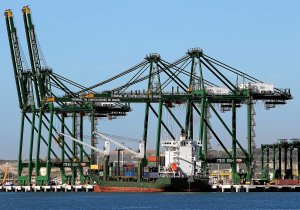
HAVANA, Cuba, November www.cubanet.org — They say that socialism is the long way between capitalism and capitalism. Now the official press itself informs us that there is a shortcut: “Mariel, the Shortest Path” (Juventud Rebelde, Sunday, November 3rd, 2013, pages 4 and 5) is a lengthy article by writer René León Tamayo, who — with the attached comparative charts and a map of the region — lays out the benefits of the first large-scale capitalist work undertaken in Cuba by the “Revolutionary” government, which combines the capitals of Brazil, of the Cuban military oligarchy and of a million-dollar Chinese company, or, to put it more accurately, the company of a Chinese millionaire.
Perhaps a previous commitment of comparable magnitude was building the thermonuclear plant in Juraguá, province of Cienfuegos, in the era of Castro I during the affair with the former USSR, the largest of the hare-brained shipwrecks of the grandiose lunatic, truncated in April of 1986 after the Chernobyl disaster — whose cooling system was the same as would be installed at the one in Juraguá — resulting in the International Atomic Energy Agency (IAEA) not approving the launching of “our” brand-new nuclear power plant, thus saving the Island and Cubans here from the danger of disappearing by an (accidental or not) explosion. However, the Cienfuegos nuclear plant was still part of a distinctly socialist project in a program of “solidarity” among communist regimes. In the 80’s, talk of capital in Cuba was total heresy.
Mariel, on the other hand, is, in the words of General-President, “a creation for the present and for the future”, a capitalist project of these times when the official press talks openly about capital investment, including the previously contagious and dirty foreign capital. However, the numbers earmarked are still undisclosed. Some of the questions that were left unwritten by the journalist and his bosses are: how much will Cuban investment amount to, what its source is, how much of the also undisclosed “national budget” is destined to the projects at the Special Zone for the Development of Mariel (ZEDM), what specific benefits the Cuban population will get from this investment, and when.
But some things don’t change, as in the case of ambiguous language and cryptic messages; a journalistic style for generating optimism in an impoverished population that desperately needs good news, but to whom it’s advisable not to disclose too much information. As for domestic and foreign investors, “Mariel opens up a unique opportunity: a niche which offers the advantages that characterize these locations anywhere, but with the added value of being in a country that will be strategically situated in maritime shipping and global commerce when the Panama Canal expansion is completed in 2015.”
The article does not seem to say much, but it explains, between the lines, the reason for the Cuban authorities’ growing offensive against the US embargo, a topic which gained prominence in the government discourse only since 1992, after the end of Soviet-socialist protectorate. Elements are sketched for the likely emergence of a new stage in the regional geopolitical map in the medium term in which relations between investor countries, particularly those of Cuba and the U.S., might define the pattern and intensity of trade via maritime channels, among other issues.
So now it turns out that Cuba is not dangerously close to the enemy, as they have repeated to us for decades, but — on the contrary — Cuba enjoys a “geographical blessing” that seems to give it natural advantages over other nations, the same blessing that between the XVI and XVIII centuries drove the fleet of the Spanish crown to cluster in Havana before sailing to the metropolis.
The 465 square kilometers [180 square miles, more or less] from six municipalities in the province of Artemisa, with the possibility that the Council of Ministers might incorporate other areas, “provided they contribute to best achieve the objectives” is in the vanguard of future Special Zones that will be undertaken in other areas of the Island, which is already being heralded by the cymbals and trumpets of the official press. The benefits we will receive remain as inaccessible as the financial secrets of the work. Everything indicates that the ZEDM is the baptismal name that the promising capitalist enterprise of the “communist” cupola has been given, another cloud in the Castros’ fiscal paradise.
Translated by Norma Whiting
Cubanet, 5 November 2013
